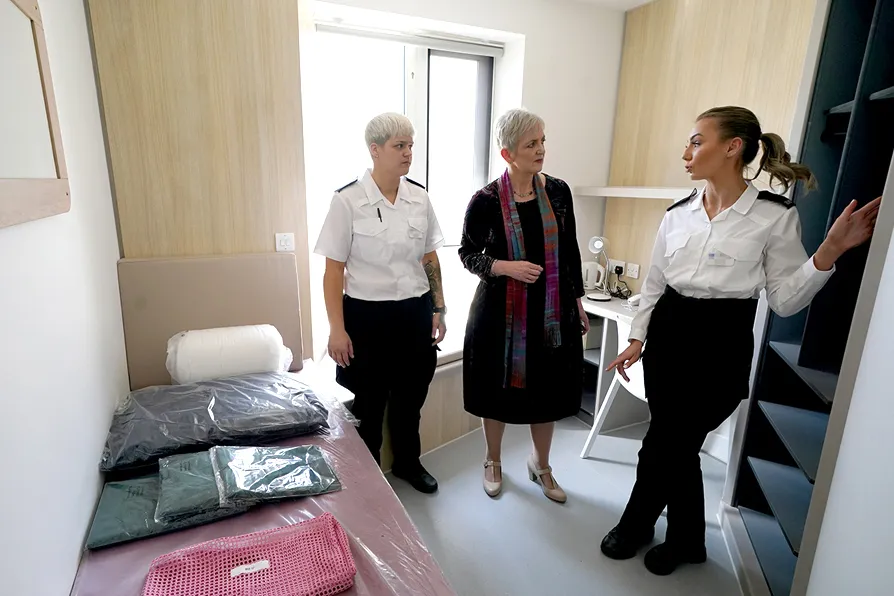The Carpathia isn’t coming to rescue this government still swimming in the mire, writes LINDA PENTZ GUNTER
IAN LAWRENCE welcomes the government sentencing review but warns past experience shows such words rarely translate into meaningful action

 CHANGE SLOW TO COME: Scotland Justice Secretary Angela Constance (SNP) meets prison officers during a visit the new HMP and YOI Stirling
CHANGE SLOW TO COME: Scotland Justice Secretary Angela Constance (SNP) meets prison officers during a visit the new HMP and YOI Stirling
AFTER years of warnings from Napo, the government’s sentencing review has finally acknowledged what our members have known all along: probation is in crisis.
There are proposals here that deserve recognition. The review picks up many of the changes we’ve been demanding for years. More professional discretion, a renewed focus on rehabilitation and an end to the culture of endless tick-boxing.
But as ever, the real question is — will anything be different? We have been asking His Majesty’s Prison and Probation Service (HMPPS) to make many of these changes over the last two years to little avail.
Probation must return to its roots
The review rightly identifies that probation has drifted away from its purpose. Decades of underinvestment and political interference have pushed us into a model that prizes enforcement over engagement.
But our members aren’t enforcers. They’re professionals working with people whose lives are often complex, chaotic and marked by trauma. They need systems that support that work, not structures that hinder them.
One of the more encouraging proposals is the plan to revoke rehabilitation activity requirements in favour of a single probation requirement that can be shaped to individual need. Done properly, this could help restore professional judgement to the frontline.
A broken structure needs more than tweaks
These problems aren’t just about policy, they’re structural. Trust in HMPPS leadership is low. The Rademaker Review made that clear, and our own submission to this review echoed it.
The reality is that probation, in its current form, isn’t working. It cannot continue as a Civil Service agency run through a prison-focused HMPPS.
If the government really wants an effective probation service that delivers on its rehabilitative and public protection objectives, it needs to invest in the right things. Not in more private contracts or shiny tech, but in people.
That means pay. Not vague pledges. Not promising words. A proper pay rise for staff who have kept this service going and the public safe under impossible conditions.
Early signs are not encouraging
Not long after the review was published, we saw two worrying developments from government, both of which risk undermining any sense of progress.
First, the proposed expansion of pilot schemes involving medical intervention and so-called “chemical suppression” for some people convicted of sexual offences.
The existing pilot hasn’t even finished, yet the government appears keen to press ahead. And worse still, there are suggestions it could become mandatory.
This would be a deeply unethical step. Those pushing it should reflect on one of the most shameful chapters in probation’s history. It has no place in a modern justice system.
Second, the suggestion that unpaid work could be delivered through private-sector companies. Let’s be clear: that’s forced labour for profit.
Napo cannot and will not support any scheme that uses unpaid labour to replace real jobs.
This government may be happy to swap low-wage work for no-wage exploitation. We are not.
The choice is clear
The sentencing review gives us a chance to do things differently but only if there is real change. Structural reform, front-line investment and a clear rejection of headline grabbing gimmicks must follow.
Our members are doing everything they can to keep the service afloat and the public safe. Now it’s up to the government to deliver.
Ian Lawrence is general secretary of probation union Napo.

A just transition to Great British Railways and a clean and safe railway for all is not only desirable but also necessary. MARYAM ESLAMDOUST explains

MARK FAIRHURST highlights the main issues facing officers in a long neglected service, and raised by front-line delegates at POA conference last week, including understaffing, violence, bullying and the ongoing denial of workers’ right to strike












